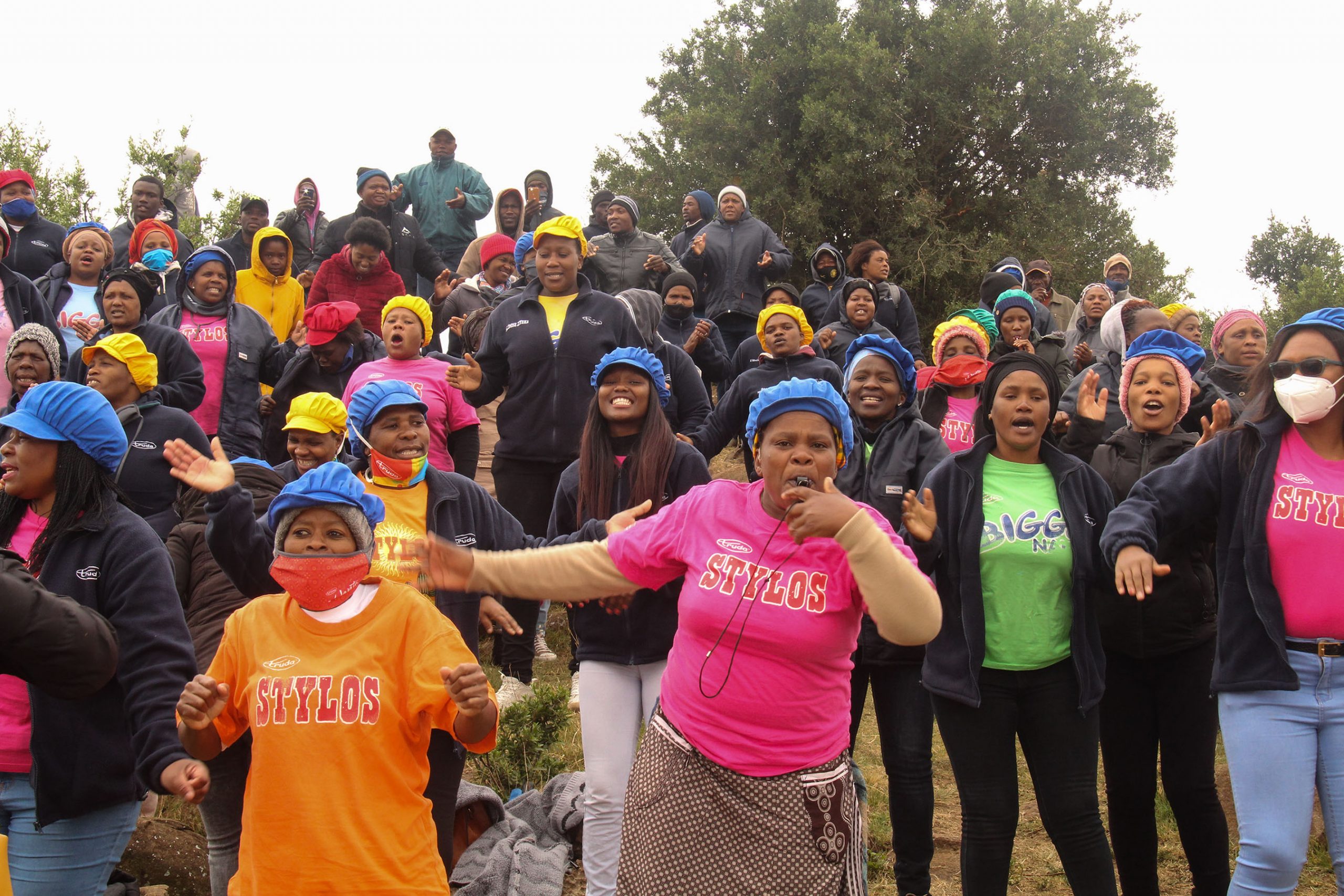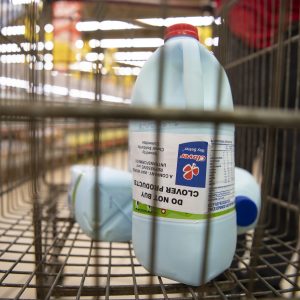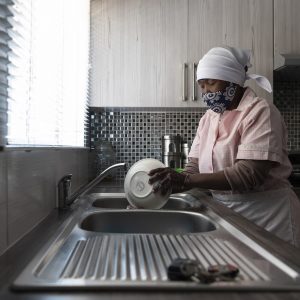Workers suspended for social media likes
In the first of this three-part series on worker rights, food factory employees in Komani fight their suspension for the ‘indecent conduct’ of liking posts by their union and a residents’ associati…
Author:
5 November 2020

Although it is nearly summer, it is a bitterly cold day in the township of Ezibeleni near Lukhanji Mountain in Komani in the Eastern Cape, where it snows in winter. About 150 workers gather on a tiny hill in the biting wind to protest against being suspended from work by their employer, Truda Foods.
Truda suspended several workers on 15 October for “liking” posts (in September) made by their union’s general secretary and the Komani Residents Association (Kora), to which they also belong. Kora is a campaigning civic organisation that aims to unite the residents of Komani, regardless of their political affiliations, “to demand proper service delivery, fight corruption wherever it is found and hold those in power accountable”.
According to Kora and the South African Security and Allied Workers Union (Saswu), other workers then went on a wildcat strike in support and were also suspended.
Olwethu Samente, Vuyiswa Gontsana, Luyanda Qumza, Yolisa Alam, Zethu Sopete and Lungiswa Solundwana say they received letters suspending them for committing “any action/conduct detrimental to the interest of the employer” and “indecent/inappropriate conduct” because they had liked various Facebook posts the previous month, which the employer later said had brought Truda’s name into disrepute.
A Truda document submitted to the Labour Court as part of an application for an interdict lists these posts as one by Kora secretary Thulani Bukani, which said “… the clock is ticking, the guerrillas on the ground are ready to collect responses from those different places, we are coming raining or not”, referring to demands for improved working conditions that Kora and Saswu had made.

They also objected to a comment made by Kora deputy chair Zolile Xalisa, which accused Truda of “ill-treatment [of workers] and racism”, and a post by Saswu general secretary Xolile Mashukuca in July 2020 that described Truda Foods as a “living horror of workers” and included crude insults about a manager known as Carlos, who was referred to as being “Zimbabwean born”.
“As a consequence of [Truda’s] employees liking the offensive Facebook postings, disciplinary proceedings were instituted,” said Truda in the court papers.
However, Mashukuca said his union is not xenophobic and that workers had raised numerous problems with Truda’s management team about Carlos’ conduct. “The statement is a metaphor commonly used in revolutionary culture to describe the conduct of a Black man who oppresses fellow Blacks and there is nothing racist about it,” he said.

Company policy
After being suspended, these workers asked to see Truda’s social media policy. Instead, they say they were given Truda’s disciplinary code, which details the offences that Truda classifies as minor transgressions, misconduct, serious misconduct and very serious misconduct. But there is nothing in the disciplinary code related to social media.
“When I asked for the social media policy, the senior HR [human resources], Louis van Deventer, said there is none. He said it’s a private company so workers don’t have a say about how they operate. We don’t have a problem to be charged by them if we did something wrong, but this must be in accordance with labour laws,” said Qumza.
“They even objected to us liking a Kora post about a service delivery march on the municipality, which had nothing to do with Truda Foods. I can say management is targeting us because the employees elected us to present their grievances. Ever since then, we have never been in management’s good books,” said Alam.
Related article:
With Truda being one of the biggest employers in the town, which is 200km from the nearest city, East London, unemployed people often line up outside the factory gates looking for work. The workers say the company uses this against them.
“We are not safe at work,” said Samente. “We wanted a union to represent us in disciplinary hearings. We have no one and are also not allowed to bring our colleagues to hearings. When they charge us, they expect us to appear alone. People are fired regularly. They say to us, ‘If you don’t like it, we have people waiting outside the gate,’” he said.

A good start degenerates
Bukani said Kora worked well with Truda Foods during the early stages of the lockdown, making up food parcels for impoverished residents with food donated by Truda. Because of this relationship, he approached Truda management in good faith when he heard that workers were experiencing problems at work.
“The workers came to our Kora meetings and began disclosing the poor conditions they are working under and so we set an appointment with Truda managers. When we started listing those grievances, they said, ‘No, there is no such thing. Just go away, we don’t have the time for you. All of these grievances that you brought to us are untrue,’ even though we only read one sentence.
“They threatened that they will no longer donate food. We said, ‘That’s fine, you can stop donating to us if you don’t want to be told when you are doing wrong things,’ and that is when the entire thing started,” said Bukani.
After the workers were told they should not have liked the posts on the Kora Facebook page, they were suspended, others downed tools, an unprotected strike took place and a week later, in October, Truda Foods won an interim interdict against Kora and its leaders, Saswu and Mashukuca, and 81 named employees of Truda Foods. The Labour Court in Port Elizabeth will decide on 9 December whether or not to make the interim interdict final.
Related article:
The interdict bars the union, community organisation and 81 workers from “threatening, harassing and interfering” with other workers, preventing other workers from going to work and interfering with Truda’s operations. It also prevents the Kora and Saswu leaders from posting “untrue and defamatory” statements about Truda Foods on social media.
Truda Foods chief executive officer Colin van Heerden said Kora and Saswu are “fake” organisations that intimidate workers into not coming to work. He said they “stoned the houses of old women” and threw petrol bombs at merchandisers, and that Saswu is not registered. But Kora and Saswu said workers at Truda just want to be unionised and that they do not know who committed the violent acts.
“We have applied for registration,” said Mashukuca, referring to a Labour Court judgment that says nothing in the Labour Relations Act prevents an unregistered union from recruiting members while awaiting registration and representing them in disciplinary hearings, or from initiating wage negotiations.

Unfair dismissal cases
Mashukuca said he has filed cases of unfair dismissal for all the workers at Truda who were suspended without pay. Suspension should always be on full pay, unless the employee agrees to forgo their pay. Employees can also only be suspended if there is “a reasonable apprehension that the employee will interfere with investigations or pose some other threat”, said senior consultant Jan du Toit of the South African Labour Guide.
“Employers should take note that they should refrain from hastily resorting to suspending employees when there is no valid reason to do so. Unless the circumstances dictate otherwise, employees must be offered the opportunity to be heard before being placed on suspension,” said Du Toit.
When asked why Truda Foods had placed workers on unpaid suspension, Van Heerden first said, “I don’t think you can suspend people without pay, and we never done it [sic]”. He said the workers were not suspended, but “for all intents and purposes remain on an unprotected strike”. When asked why workers had received letters from Truda Foods suspending them if the company thought they were on strike, Van Heerden conceded that the workers had actually been suspended three weeks ago and should be paid. “I have asked HR to prepare the payments,” he said.
A few minutes later, Van Heerden said disciplinary hearings had taken place for all suspended workers in their absence after they “failed to attend”. But Bukani said, “Some workers were denied entry to the factory by security after supervisors pointed them out as Kora members.”

Struggle to unionise
Independent labour researchers and former senior trade unionists Dale Forbes and Woodrajh Aroun say workers in small towns who are trying to unionise their workplaces face many difficulties.
“These workers are caught in a cul-de-sac where the employer does not recognise their union and refuses to negotiate. For workers in small unions struggling to gain recognition, it is like being caught between the devil and the deep blue sea,” said Aroun.
“The current extreme crisis of unemployment exacerbated by the coronavirus pandemic has given employers renewed confidence in clamping down on legitimate union activity. Glaringly ignoring one’s workforce in these perilous times is both short-sighted and dangerous. The employer is inflaming a dangerous situation. The key message is that there needs to be an open and honest communication process that engages with the grievances of the workforce,” said Forbes.
Part two of this series features workers who have been badly injured in workplace accidents and employees who say they have been subjected to strip searches.



